One of my mantras in the early days of our move to the ranch was, “It’s about dignity.” Those early days were fresh and fragile as I was very conscious of the milieu being created in our new intergenerational living experience. We had relocated in search of an environment of dignity for Mother and Dad – one filled with their personal “real life pleasures.”
In 2001, Google and Yahoo were still quite young as I searched on-line for “dignity for elders” to see what wisdom might be accessed through the still-new “www.” The search results included a two-page article describing “Dignity Therapy” – my introduction to the work of Dr. Chochinov.
Dr. Harvey Max Chochinov, Author, Dignity Therapy

The Journal of the American Medical Association (JAMA) first published an article about Dignity Therapy in 2002. Subsequently, it has been studied and embraced by palliative care clinicians in many countries around the world.
Published in 2012, the book is written for clinicians, hospice, palliative care professionals, and those in the helping professions. Dignity Therapy: Final Words for Final Days is a beautiful handbook which includes a complete description of how to conduct Dignity Therapy.
“Nothing More Can Be Done”
It provides a healing transition for end-of-life – at a time when many would believe that “nothing more can be done.”
Dignity Therapy is a healing intervention which helps the patient identify meaning and value in one’s life as one approaches the end of life. It is a process guided by a trained palliative care clinician in which people are given a chance to talk about things that are most important to them by responding to a set of questions posed by the clinician. Conversations are recorded, transcribed, and edited with a final type-written document being returned to the person to share with family and those they care about.
An Antidote to Hopelessness
The author reports that in study after study, “patients indicate that they like and feel satisfied with it, and report that 
It is one of the first empirical studies about dignity from the perspective of dying patients. The author states that this form of therapy is empirically solid. It is evidence-based and the data are strong. In addition, it carries a significant value of generativity and legacy for family members, an important aspect of Dignity Therapy.
“…May Be Dying for Lack of Dignity…”
Dr. Chochinov states, “…while patients may be dying for lack of dignity, the medical literature is relatively silent on how dying patients experience or understand the notion of dignity – that is, until now.”
The study of Dignity Therapy, directed by an internationally-recognized psychiatrist leading a team of research scientists at a major university, validated my own exploration for meaningful and purpose-filled ways to relate with my parents during our time together.
The author briefly addresses other modes of generativity for families – such as creating video recordings and audio recordings. He states that Dignity Therapy is not intended as a replacement for other forms and outlets for family legacy and generativity.
My appreciation continued to grow for two legacy documents, each quite different from the other. I observed more closely and developed a deeper understanding of the value of generativity work.
The Stories of Their Lives
During our ranch years, we engaged in these and many related 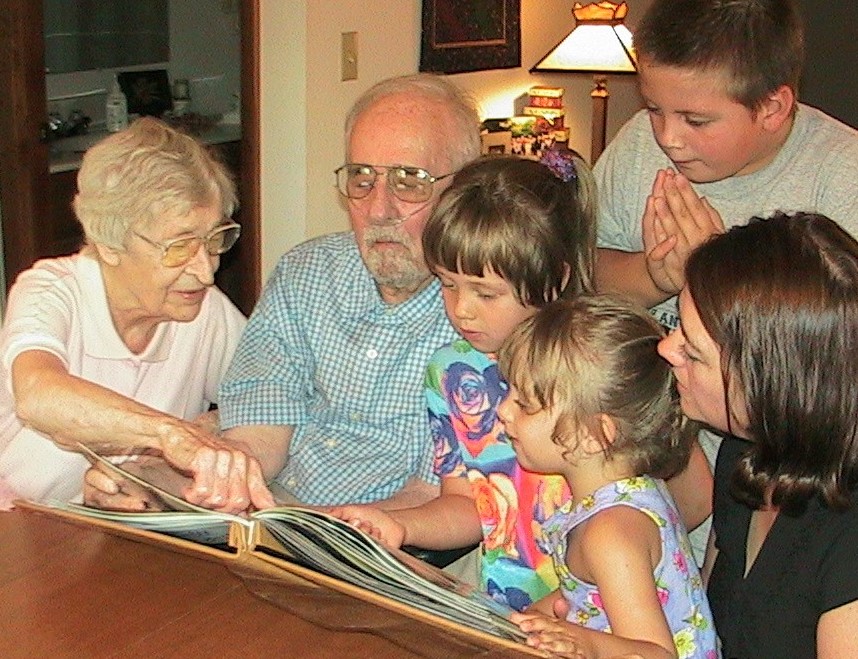
Reconnecting Mother and Dad with the stories of their lives was important during the “present moments” of the development stage. But the value on an ongoing basis – when reviewed together or individually – time after time – appeared to be simply priceless.
Mother’s Autobiography – Exuding Her Joy
Unprompted, Mother would sometimes stand to happily read her wonderful autobiography – oratorically and repeatedly to everyone within hearing distance. She would finish her reading on an upbeat note which exuded joy and accomplishment. Her sense of accomplishment came – I believe – not only from her delivery to an engaged and delighted audience but also from her story – a life well-lived.
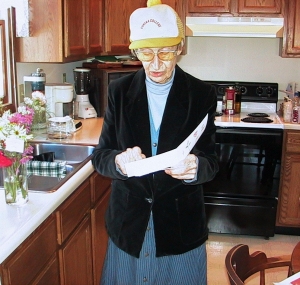
It was this document which she read orally when – with some finality – it appeared she no longer had interest in reading her other books. She continued reading it until she became bedfast in the final seven months, at which time, a faithful volunteer read it to her. In my experience, it was truly an inspiring “gift” filled with hope, meaning, purpose – and dignity.
Dad’s “Life Résumé” Appears to Bring Acceptance and Peace
I arrived from Chicago on a weekend to find Dad wrapped in a blanket and sitting in a small, semi-dark living room. Ten days before, he had been out mowing his lawn and managing final details related to the sale of their home prior to moving into this apartment in a retirement center.
Later that weekend, I took Who’s Who in the Midwest from the shelf and turned to the page with his entry, containing a long list of detailed accomplishments from his working years. “Dad, let’s write your résumé – your life résumé.”
He quickly rose to the occasion as we reviewed a long list of leadership positions – in which he had served as both board member and president. These included numerous agriculture organizations, the community association, school board, Rotary International – as well as serving on the planning committee of the Pumpkin Festival. In addition, he had served as a fund-raiser for numerous institutions over a period of years – all at an earlier time in his life. Together, we added a one-page narrative to his impressive record of community service. It took three sessions to finish the “life résumé” – after which it was typed and bound in final form.
Once we moved to the ranch, I would see him reading it silently – after which he would take a deep breath, appear to relax, and then tuck it into a drawer within arm’s reach. Quiet, but very alert, and yes – dignified.
In one of those private moments when they were sitting together on their loveseat, I overheard him say to Mother – with acceptance – “We did the best we could with what we had.”
Why Study Dignity?
Both of these legacy documents had been completed prior to “Dignity Therapy” coming into my awareness via the Yahoo internet search for “dignity for elders” in 2001.
I came to this writing experience with my father based only on intuition – and as a way to engage with him. I have now become more convinced that these were important documents in our lives together. I bore witness to something simple, but profound. With Dad’s life résumé, it was more quiet and dignified – and could more easily be missed. With Mother’s autobiography, she spread the joy – while at times, standing to command our attention.
If dignity could be bottled to provide these results, we would all have refillable prescriptions.
Dignity Therapy – Now Used World-Wide
Almost two decades after first reading about Dignity Therapy, it is now used in many places around the globe.
_______________
Harvey Max Chochinov, MD, PhD, FRSC
Dr. Chochinov is the Distinguished Professor of Psychiatry at the University of Manitoba and Senior Scientist, Research Institute of Oncology and Hematology, CancerCare Manitoba.
Author: Dignity Therapy: Final Words for Final Days (2012)
Website: www.dignityincare.ca/en/approach.html
Author: Susan Troyer
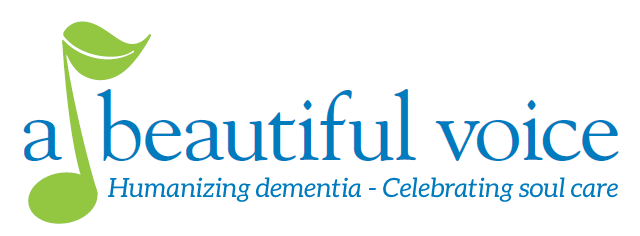

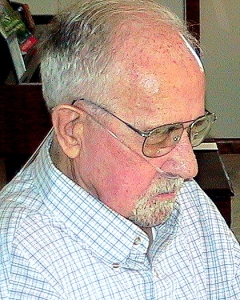
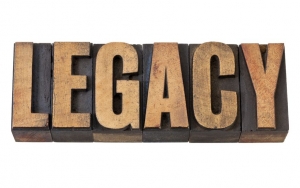

Leave A Comment